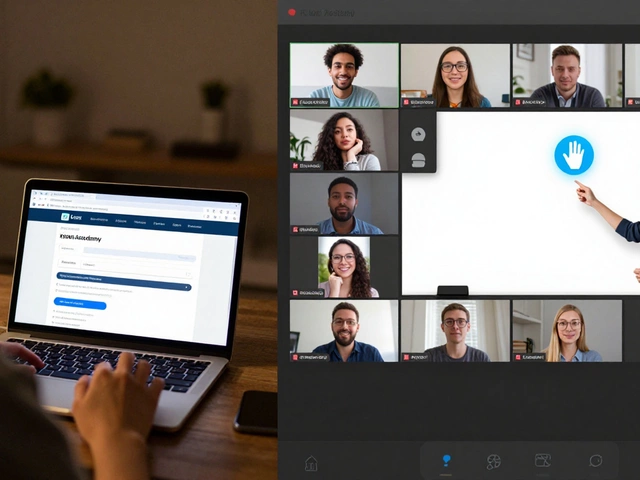Learning Platform Selector
Which Learning Platform Fits You?
Answer these questions to find your ideal platform type:
Your Recommendation
Select your options to see results
Select your learning goals to see your recommended platform type
Not all online learning platforms are the same. If you’ve ever signed up for a course and felt lost because it didn’t match what you needed, you’re not alone. The problem isn’t the platform-it’s that you picked the wrong type for your goal. There are exactly three main types of online learning platforms, and knowing the difference can save you months of frustration and wasted money.
1. Learning Management Systems (LMS)
Think of an LMS as the digital classroom your school or company uses. These platforms are built for structured, organized learning. They’re not flashy. They don’t promise viral content or celebrity instructors. What they do well is deliver curriculum in a controlled way.
Companies like Moodle, Canvas, and Blackboard are classic examples. They let teachers upload lectures, assign quizzes, track progress, and send grades. If you’re taking a college course online, your school is probably using one. If your employer is training you on new software, they’re using one too.
Here’s what makes LMS platforms unique: they’re designed for accountability. You can’t skip a module. You can’t rush through a quiz. Your progress is logged. This works great if you need certification, compliance training, or structured skill-building. But if you just want to learn Photoshop for fun, an LMS will feel like a prison.
2. Massive Open Online Course (MOOC) Platforms
MOOC platforms are the big names you see on ads: Coursera, edX, Udemy, FutureLearn. These are the ones that promise you can learn Python from Stanford or marketing from Harvard-all for a few bucks a month.
Unlike LMS, MOOCs are open to anyone. You don’t need to be enrolled in a school. You don’t need to wait for a semester to start. You click, pay (or go free), and start watching. The content is usually pre-recorded video lectures mixed with readings and quizzes. Many offer certificates, but those are often not accredited unless you pay extra.
Here’s the catch: MOOCs are self-paced, which means they rely on your discipline. Studies show that fewer than 10% of people who sign up for a MOOC actually finish it. Why? Because there’s no teacher checking in. No deadlines. No peer pressure. If you’re someone who needs structure, a MOOC might feel like a dead end.
But if you’re curious, self-driven, and want to explore topics before committing to a degree, MOOCs are perfect. They’re also where you’ll find the widest range of subjects-from quantum computing to medieval poetry.
3. Skill-Based Practice Platforms
This is the newest and fastest-growing type. These platforms don’t teach you theory-they make you do. Think of them as fitness trackers for your brain. You don’t just watch a lesson on coding-you write code. You don’t just read about Spanish verbs-you speak them aloud and get instant feedback.
Platforms like Codecademy, Duolingo, Khan Academy (for math and science), and Sololearn fall here. They use interactive exercises, spaced repetition, and real-time corrections. Duolingo, for example, doesn’t just show you vocabulary. It asks you to translate sentences, listen to pronunciation, and even speak into your mic. If you get it wrong, it adapts. If you’re right, it moves on.
These platforms work because they mimic how humans actually learn skills: by doing, failing, and trying again. They’re ideal for building muscle memory in areas like coding, languages, math, or music. But they’re not great for deep theory. You won’t learn the history of the French Revolution on Duolingo. You won’t understand the architecture of a neural network on Codecademy.
They’re also addictive. That’s by design. Badges, streaks, leaderboards-they tap into the same psychology that makes games engaging. That’s why people use them daily, even for 10 minutes. It’s not learning-it’s habit-building.

How to Pick the Right One
So which one should you use? It depends on what you’re trying to achieve.
- If you need a certificate for your resume or job-go with an LMS or a MOOC with accredited credentials.
- If you’re exploring a field before committing-start with a MOOC. Try a free course first.
- If you want to build a real skill like coding, speaking Spanish, or doing Excel formulas-use a skill-based platform. Practice daily.
Here’s a real example: Sarah wanted to switch careers into data analysis. She didn’t start with a degree. She didn’t enroll in a university course. She used three platforms at once:
- Codecademy to practice Python and SQL daily (skill-based)
- Coursera to take a data analysis course from IBM (MOOC)
- Her company’s internal LMS to learn how their reporting tools worked (LMS)
Three months later, she landed a junior analyst job. Not because she had a degree-but because she built proof of skill, knowledge, and familiarity with real tools.
What Most People Get Wrong
People think the best platform is the one with the most videos or the prettiest interface. It’s not. The best platform is the one that matches your learning style and goal.
Here are three common mistakes:
- Signing up for a MOOC because it’s cheap-then quitting after two weeks because you have no accountability.
- Using an LMS for personal hobbies-like learning guitar-when you’d be better off with a skill-based app that lets you play along.
- Believing that a certificate from a MOOC equals a degree. Most employers know the difference. They care more about what you can do than what you clicked through.
The truth? You don’t need the most expensive platform. You need the right one. And most people don’t need just one-they need a mix.

Hybrid Learning Is the New Normal
The most successful learners today don’t stick to one type. They combine them. They use skill-based platforms to build daily habits. They use MOOCs to fill knowledge gaps. And they use LMS systems when they need formal recognition.
For example, a teacher preparing for a certification exam might:
- Use Khan Academy to review math concepts daily (skill-based)
- Take a MOOC on educational psychology to understand learning theories
- Complete a final project through their district’s LMS to earn credit
This layered approach is more effective than any single platform. It builds both skill and credibility.
Are MOOCs worth it for career advancement?
MOOCs can help, but only if you pair them with real projects. A certificate alone won’t get you hired. Employers care about what you can do. If you took a Coursera course on Excel, show them a spreadsheet you built using those skills. That’s what gets attention.
Can I use an LMS for personal learning?
Technically yes, but it’s not practical. Most LMS platforms require enrollment through an institution. You can’t just sign up on your own. Some, like Moodle, can be self-hosted, but that’s for tech-savvy users. For personal learning, MOOCs or skill-based platforms are far easier.
Which platform is best for learning a language?
Start with a skill-based platform like Duolingo or Memrise to build daily habits. Then supplement with a MOOC for grammar and culture. If you need official certification (like for immigration or school), look for an LMS-backed program from a university or language institute.
Do I need to pay for any of these platforms?
No, not always. Most MOOCs let you audit courses for free. Skill-based platforms like Khan Academy and Duolingo are free with optional upgrades. LMS platforms are usually free if you’re enrolled through a school or employer. Pay only when you need a certificate, graded feedback, or offline access.
Can I combine all three types at once?
Yes, and you should. The most effective learners use each platform for what it does best: skill-based for daily practice, MOOCs for breadth of knowledge, and LMS for structure and credentials. Mixing them creates a complete learning ecosystem.
Final Tip: Start Small, Then Layer
Don’t try to master all three platforms at once. Pick one based on your goal right now. If you’re stuck, ask yourself: Do I need to prove I learned something? Use an LMS. Do I want to explore a topic? Use a MOOC. Do I want to get better at doing something? Use a skill-based platform.
Once you’ve built momentum, add the next one. That’s how real learning happens-not by chasing the perfect platform, but by using the right one at the right time.



